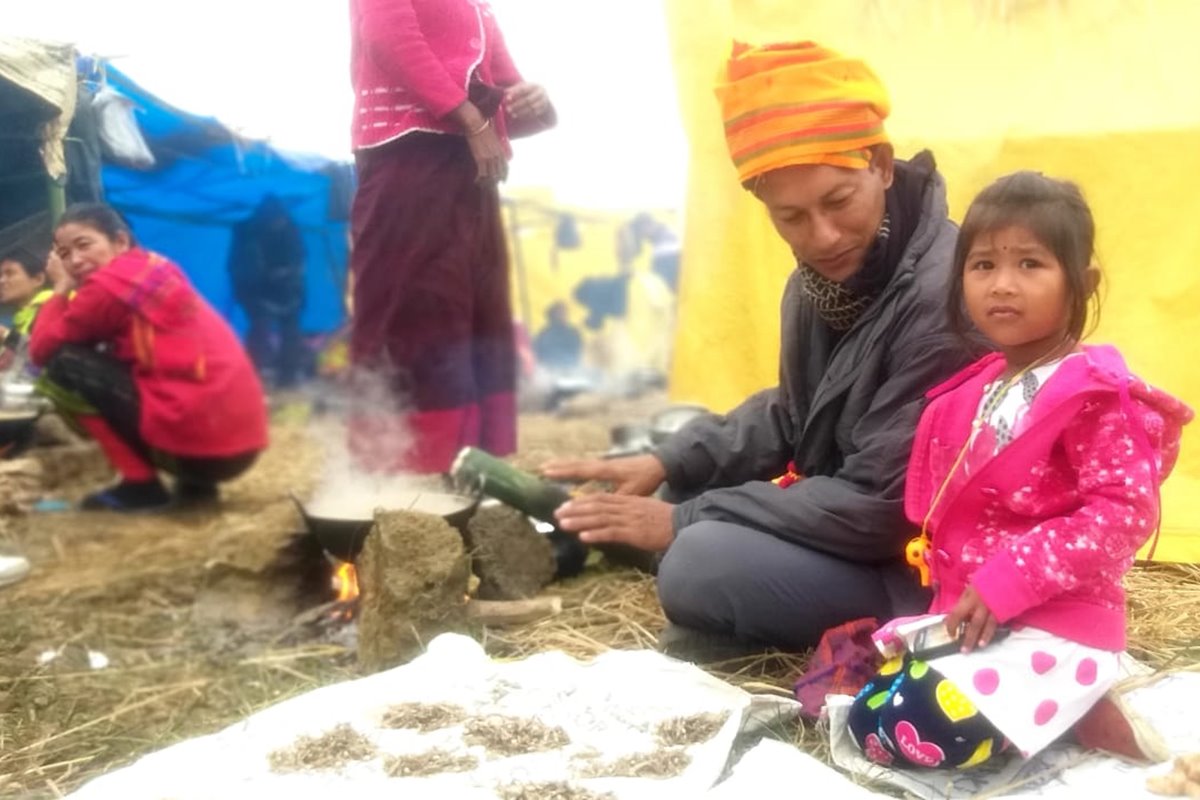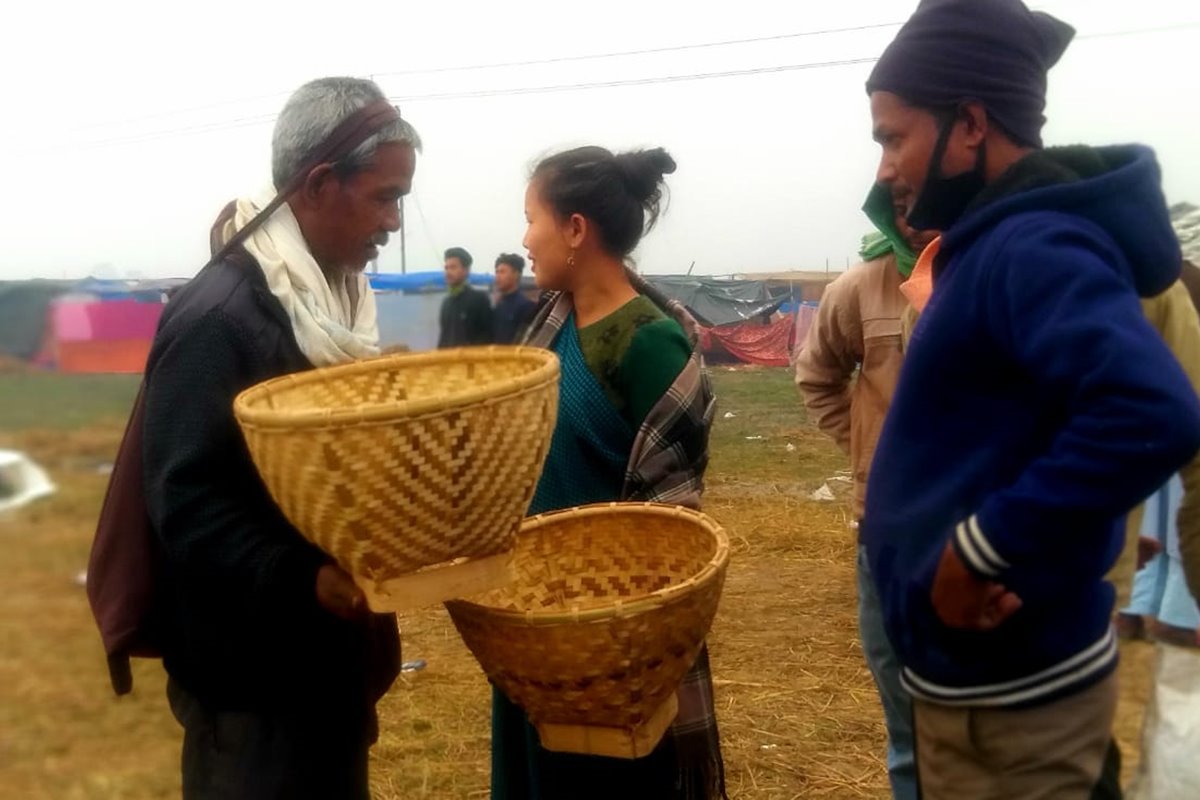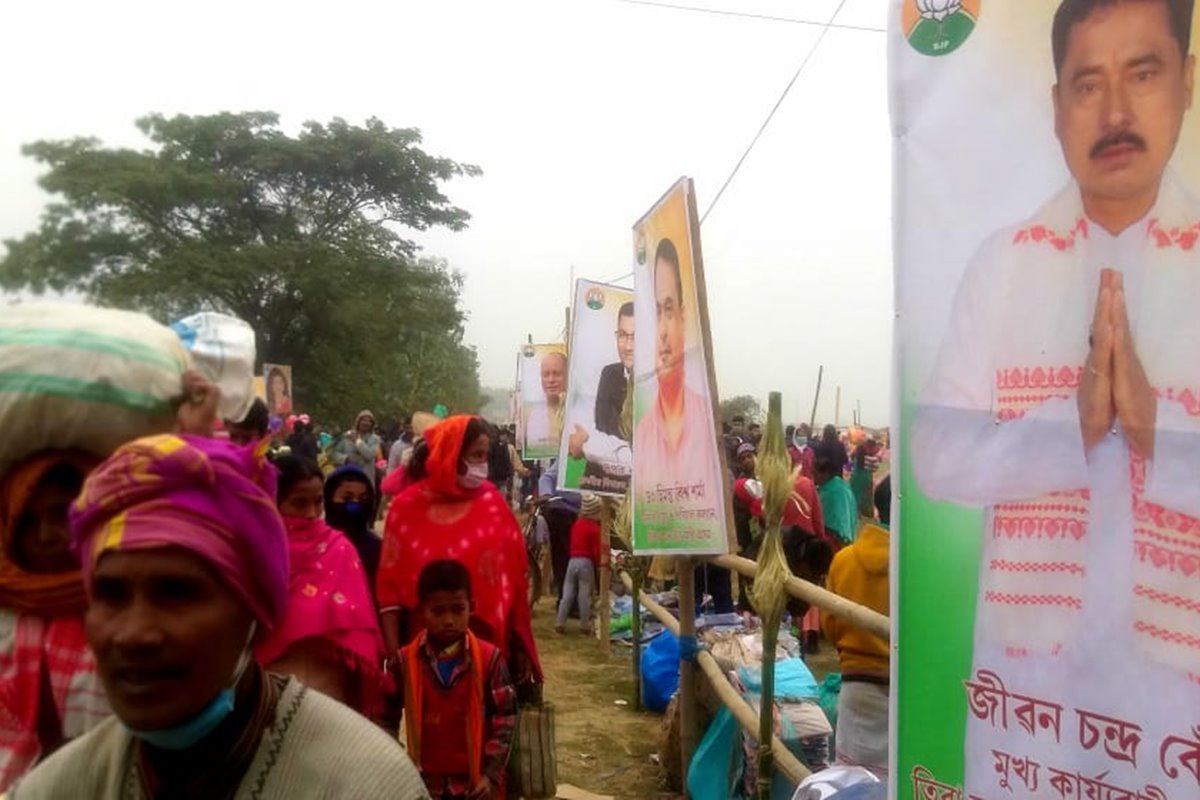[ad_1]
For Indrani, a corporate professional from Guwahati, it was not only a pre-dawn sixty-kilometre drive from the Assam capital but a rare opportunity to break through the shackles of the busy city life and acquaint herself with a traditional trade that exist only in this part of the country.
“I brought my mother and elder sister along. This is the first time that I have come to the Joonbeel Mela. I brought a good amount of homemade ‘teel pitha’ (local sweet delicacy) which I exchanged with wild turmeric and ginger and a local folding knife with the indigenous people. It’s crazy that in this age of crypto money I could literally buy things without any currency,” says Indrani.
As dawn broke, more than 20,000 people were half done with their trading. The fairground was an open area, slightly bigger than a football field, by the side of a crescent-shaped water body called Jonbeel. The lake that lends its name to the fair (jon is moon and beel is lake), also witnesses community-fishing during in the latter half of the day. It’s the second day of the annual fair of the Tiwa community. The fair is a melting pot of people from the hills and the plains, who come together to trade with each other various commodities.

People from distant villages and the hills came to join the trade fair. (Image: News18)
Rina Rongpi, a local from Jagiroad, says, “I have brought pithas (local delicacy made of rice flour and sweetened sesame seeds). I traded two peethas for a hand full of turmeric. I took ten portions of turmeric for 10 pithas. It’s interesting, we do not deal in cash here but nothing is measured on scales too. It’s all ‘bhags’ (parts). One has to trust the partner you are trading with.”
Held in Dayang Belguri in Morigaon, Jonbeel Mela is organized by the Tiwa community, with participants from the Tiwa, Karbi, Khasi and Jaintia communities, coming from the interiors of the state’s Morigaon and Karbi Anglong districts, as well as, some border villages of Meghalaya. The Tiwas, one of the many Tibeto-Burman tribes found in Assam, are subdivided into hill Tiwas and plains Tiwas, based on their habitat. They have their own language and culture, though most of them now speak Assamese.
The Jonbeel Mela is organized under the patronage of the Gobha kingdom. The Gobha Roja (king) oversees the arrangements for the fair and conducts a “durbaron” on the culminating day. The kings, on this day, meet and interact with the people to try and understand their issues. He also collects the Khajna (tax) for the traders in the fair.

Participants bring along various commodities for barter at the trade. (Image: News18)
“This year there were apprehensions about organising the mela amid pandemic concerns. I personally made a survey in neighbouring Meghalaya, Karbi Anglong and Morigaon district on the COVID situation. Thing weren’t bad in our areas and therefore we decided to move ahead. This year, however, we made sure the traditional mela is more scattered, with separate arena for the barter fair, cockfights, and the makeshift residential area for the hill people. All 100 members of the organising committee have been tested for COVID-19,” says Jursingh Borodoloi, Secretary Junbeel Mela organising committee.
“It is difficult to monitor things when more than 1.5k tribal and non-tribal people are gathering at a place, still we are a keeping a close watch to keep things as dispersed as possible,” adds Bordoloi. The fair this year has more than 350 stalls.
Participants in the mela from distant villages and the hills, often addressed as Mama and Mami, bring with them local rice, lac, pumpkin, wax gourd, sponge gourd, yam, cinnamon barks, raw pepper, dried fish, baskets among other things. However, in the barter trade this year it’s the turmeric and ginger which sold like hot cakes as people from the plain traded them with dried fish, puffed rice, flattened rice and pithas.
“The high demand for turmeric and ginger is primarily because they are the wild varieties and are of high value. However, the demand is more so due to COVID as these days almost all use turmeric and ginger as immune booster,” says Bordoloi.
Ahead of the mela, an Agni Puja (fire worship) is performed for the well-being of the mankind. The Gobha King, along with his courtiers, visits the mela and collects taxes from his subjects. On January 17, 2009, the Government of Assam announced an “Annual Royal Allowance” for the 19 customary kings from communities under the Gobha Kingdom that includes parts of three districts of present Assam Morigaon, Nagaon and Kamrup. The allowance, which was Rs 60,000 earlier, has been enhanced to Rs 1 lakh and handed to the titular kings during the durbar (meeting) of Junbeel.

Posters of BJP leaders lined the Joonbeel fair. (Image: News18)
Along with the barter trade, the fair this year, which commenced just after the Tiwa Council Elections and ahead of the 2021 assembly elections to be held sometime in early April, has a strong imprint of BJP. Posters of Prime Minister Narendra Modi, Chief Minister Sarbananda Sonwal and state Health Minister Himanta Biswa Sarma along with the newly elected Tiwa Council minister and chief were prominent in every nook and corner amidst the sea of people. For the ruling BJP, the Junbeel provided the opportune possibilities to reach to the people who descended from the hills and gathered from the plains as well.
“All the posters are of BJP MLAs and when your party sweeps 34 out of the 36 seats in the council election you get to see them. The BJP as a party in the government thinks for the tribes of the state and likewise have initiated schemes for their benefit,” says Ramakanta Deuri, MLA Morigaon (Sadar).
An innocent Chikku, who woke up at 3.45 in the morning to witness the unique trade which had so far existed in his books, could not trade his figurine that he took along, asked his mother, “How do they buy things without money?”
[ad_2]
Source link